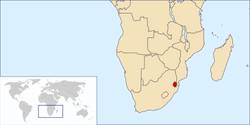|
Umbuso weSwatini | |

|

|
| Motto Siyinqaba | |
| Anthem Nkulunkulu Mnikati wetibusiso temaSwati | |
| Capital | Mbabane |
| Government | Absolute Monarchy |
| King | |
| - From 1986 | Mswati III |
| Prime Minister | |
| - From 2008 | Barnabas Sibusiso Dlamini |
| Legislature | Parliament |
| - Upper house | Senate |
| - Lower house | House of Assembly |
| History | |
| - September 6, 1968 | Independence |
| - April 19, 2018 | Name changed |
| Commonwealth accession | September 6, 1968 |
| Area | 17,364 km² |
| Population | |
| - 2009 | 1,185,000 |
| Density | 68.2/km² |
| GDP | 2009 (PPP) |
| - Total | US$ 6.7 billion |
| - Per capita | US$ 5,708 |
| Currency | Lilangeni |
| v | |
The Kingdom of eSwatini is an absolute monarchy in Southern Africa. The name was changed from the formerly official Kingdom of Swaziland in 2018,
Background
Autonomy for the Swazis of southern Africa was guaranteed by the British in the late 19th century; independence was granted in 1968. Student and labor unrest during the 1990s pressured King MSWATI III, the world's last absolute monarch, to grudgingly allow political reform and greater democracy, although he has backslid on these promises in recent years. A constitution came into effect in 2006, but the legal status of political parties remains unclear. The African United Democratic Party tried unsuccessfully to register as an official political party in mid 2006. Talks over the constitution broke down between the government and progressive groups in 2007. Swaziland recently surpassed Botswana as the country with the world's highest known HIV/AIDS prevalence rate.[1]
Economy
In this small, landlocked economy, subsistence agriculture occupies approximately 70% of the population. The manufacturing sector has diversified since the mid-1980s. Sugar and wood pulp were major foreign exchange earners; however, the wood pulp producer closed in January 2010, and sugar is now the main export earner. In 2007, the sugar industry increased efficiency and diversification efforts, in response to a 17% decline in EU sugar prices. Mining has declined in importance in recent years with only coal and quarry stone mines remaining active. Surrounded by South Africa, except for a short border with Mozambique, Swaziland is heavily dependent on South Africa from which it receives more than nine-tenths of its imports and to which it sends 60% of its exports. Swaziland's currency is pegged to the South African rand, subsuming Swaziland's monetary policy to South Africa. The government is heavily dependent on customs duties from the Southern African Customs Union (SACU), and worker remittances from South Africa substantially supplement domestically earned income. The government has also legislated that 30% of local pension funds need to be invested in Swaziland, boosting demand for government bonds. Customs revenues plummeted due to the global economic crisis and a drop in South African imports. The resulting decline in revenue has pushed the country into a fiscal crisis. The government has requested assistance from the IMF and from the African Development Bank. With an estimated 40% unemployment rate, Swaziland's need to increase the number and size of small and medium enterprises and attract foreign direct investment is acute. Overgrazing, soil depletion, drought, and floods persist as problems for the future. More than one-fourth of the population needed emergency food aid in 2006-07 because of drought, and more than one-quarter of the adult population has been infected by HIV/AIDS.[2]
King
- Mswati III (₩) (April 25, 1986 - )
Prime Minister
- Barnabas Sibusiso Dlamini (₩) (October 23, 2008 - )
Nation
Swazi Polities
Protected State of Swaziland
Neighbouring Nations
References
- The World Factbook (CIA)
- Chiefs of State and Cabinet Members of Foreign Governments (CIA)
- U.S. Department of State
- Australian Government
- Commonwealth of Nations
- Inter-Parliamentary Union - Senate
- Inter-Parliamentary Union - House of Assembly
- BBC News Country Profile
- BBC News Time Line
- World Statesmen.org
- Psephos Election Archive
- Wikipedia
